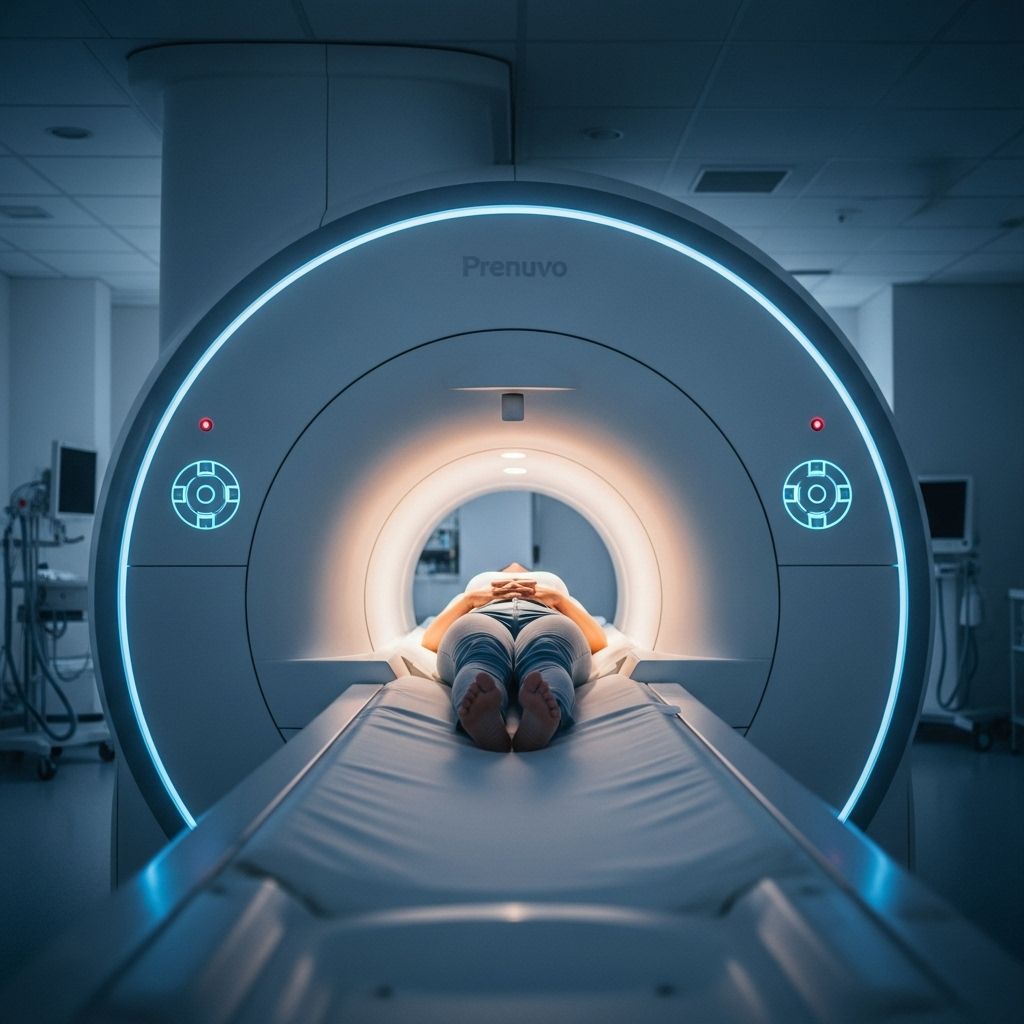Inside Prenuvo: What to Know About Full-Body MRI Scans
Advanced imaging meets proactive health insights for a clearer view of your well-being.

What Is A Prenuvo Full-Body MRI Scan?
Prenuvo is part of a new wave of wellness and medical innovations, offering fast, comprehensive full-body MRI scans aimed at early disease detection. Marketed as a way to uncover hidden health concerns before symptoms arise, it has caught the interest of celebrities and health-conscious individuals alike. But what exactly does this technology promise, and who stands to benefit?
How a Prenuvo MRI Works
The Prenuvo MRI uses magnetic resonance imaging (MRI)—a radiation-free imaging method—to generate detailed pictures of your entire internal anatomy. Unlike traditional MRIs that focus on one area in response to symptoms, Prenuvo digitizes your whole body with a highly efficient protocol that provides a broad medical overview in under an hour.
Key features:
- No radiation and no contrast dye required
- Focuses on soft tissue visualization—capturing images of organs, joints, the brain, vasculature, and spine
- Uses multiparametric imaging: multiple sequences performed concurrently for greater speed and anatomical detail
- FDA-cleared AI algorithms enhance analysis, measuring fat/muscle distribution, organ size, and enabling research into detection of subtle early disease
- Scans over 30 distinct body regions and organs, screening for more than 500 conditions—from fatty liver, tumors, to spinal degeneration
Why Was Prenuvo Created?
Prenuvo’s founders, including Dr. Raj Attariwala, envisioned an early detection platform using MRI’s strengths: detailed soft-tissue imaging without the hazards of radiation. Their goal was to give people the option to gain unprecedented insight into their health—even in the absence of symptoms—by making a full-body MRI faster, more affordable, and more actionable.
What Happens At A Prenuvo Appointment?
- Pre-visit survey: You complete a detailed health questionnaire to ensure MRI is safe for you and to highlight any areas of concern.
- Scanner experience: The actual MRI takes about an hour. Claustrophobic or anxious patients may request a light sedative. Many clinics offer entertainment options; you may watch a streaming show during the scan, making the time pass more easily.
- Optional blood work: For enhanced screening, a comprehensive blood panel is included. Blood may be drawn in the clinic or via a concierge service at home.
- Body composition and brain health analysis: These assessments are often included as part of the more advanced scan options.
After the scan, a certified radiologist analyzes the images, sometimes with the aid of AI review. Results are then prepared for your consultation.
What Is Included in the Prenuvo Scan?
| Package | Areas Covered | Cost |
|---|---|---|
| Enhanced Screening | Brain, chest, abdomen, pelvis, spine, vasculature, body composition, advanced brain health, comprehensive bloodwork | $4,000 to $4,500 (varies by location) |
| Full Body | Head-to-toe MRI of all organs | $2,500 |
| Head & Torso | Brain and torso only | $1,800 |
| Torso Only | Chest, abdomen, pelvis | $1,000 |
Note: Insurance does not currently cover Prenuvo scans, and prices are subject to change based on clinic location.
What Can a Prenuvo MRI Detect?
Prenuvo’s full-body MRI screens for a broad array of conditions. Among the most significant, it can:
- Detect early-stage cancers (including brain, liver, and kidney tumors)
- Identify aneurysms and other vascular abnormalities
- Spot neurological issues and degenerative changes in the spine
- Diagnose fatty liver disease, endometriosis, and other organ-specific disorders
- Evaluate musculoskeletal issues
Altogether, more than 500 conditions may be seen in one session—well beyond what a typical, symptom-driven scan might catch. However, the test does not image certain areas as reliably as traditional methods (such as the lungs and gastrointestinal tract), nor does it replace conventional, guideline-based screenings for breast and colon cancer. It is best viewed as a supplement, not a substitute, for established medical protocols.
Inside a Prenuvo Consultation
Results from your scan—typically delivered in about two weeks—are reviewed in a virtual consultation with a physician or board-certified radiologist. This post-scan visit lasts 30 to 45 minutes and includes:
- An overview of your MRI findings, explained in everyday language
- Review of bloodwork and body composition analysis
- Guidance on next steps, including suggestions for follow-up testing if abnormal findings were detected
- Time for any personal health questions or concerns
For most, the process provides valuable peace of mind. If a suspicious area is found, additional targeted imaging, biopsies, or referrals to specialists may be recommended.
What Are the Risks and Limitations?
- Incidental findings: Not all abnormalities flagged are dangerous—in fact, most are benign. However, these ‘incidentalomas’ may provoke stress, additional tests, or even unnecessary procedures.
- False positives and negatives: As with any test, accuracy depends on location and size of abnormalities. Small or non-threatening lesions may be seen, while some early-stage cancers or subtle pathologies could still be missed.
- Not a replacement for standard screening: Mammograms, colonoscopies, and other established tests remain the gold standard for certain cancers. MRI may not visualize every part of the body equally well (especially the lungs or bowel tissue).
- Practical concerns: MRIs are not suitable for those with certain medical implants, severe claustrophobia, or those unable to lie still for extended periods.
- Out-of-pocket cost: With prices ranging from $1,000 to more than $4,500, this exam is not universally accessible.
Who Should Consider a Full-Body MRI?
Medical experts generally recommend full-body MRI only in specific situations:
- A strong family history of cancer or genetically inherited illness
- Previous serious illness with risk of recurrence
- Need for comprehensive peace of mind about current health—after discussion with a healthcare provider
For average-risk, healthy adults, experts urge caution; the risk of over-diagnosis and potential for unnecessary interventions may outweigh the benefits. As Dr. Ken Berry, family physician, notes: “It’s a supplemental tool, not a substitute.”
Where Are Prenuvo Clinics Located?
- United States: Major cities including New York, Los Angeles, Miami, and others
- Canada: Several urban centers
- International Expansion: Clinics being opened or planned in England, Sweden, Singapore, Switzerland, and the UAE
Individuals may have to travel significant distances to access the nearest location. Always confirm before booking.
How Does Prenuvo Compare to Traditional Imaging?
| Feature | Prenuvo Full-Body MRI | Traditional Imaging |
|---|---|---|
| Radiation | None (MRI-based) | Often present (CT/X-ray) |
| Coverage | Whole body in one session | Single organ/area per scan |
| Length of scan | ~1 hour | 15-60 minutes per area |
| Analysis | AI-augmented, radiologist-reviewed | Radiologist-reviewed |
| Cost | $1,000–$4,500 out-of-pocket | Typically insurance-covered if medically necessary |
| Purpose | Screening, early detection | Diagnosis after symptoms |
Is the Prenuvo Full-Body MRI Worth the Cost?
This remains a highly individual decision. Prenuvo’s scan may offer:
- Peace of mind for those with significant risk factors
- Opportunities for earlier detection of some serious illness
- A comprehensive health benchmark (particularly useful for data-oriented patients)
However, it cannot guarantee protection from all health events, may generate anxiety or costly follow-ups from incidental findings, and comes at significant cost. For most people, thoughtfully chosen guideline-based screenings and routine medical checkups remain the primary means of disease detection and prevention.
Frequently Asked Questions (FAQs)
Q: Does insurance cover Prenuvo full-body MRI scans?
A: No. At this time, most insurers consider full-body MRI scans to be elective and non-reimbursable. Patients must pay out of pocket.
Q: How often should someone get a full-body MRI?
A: There is no official medical guideline for routine full-body MRI frequency. Most experts suggest only considering repeat scans if you have strong risk factors or after discussion with your doctor.
Q: What are the risks of full-body MRI scans?
A: The scans themselves are considered very safe, but there is risk of “incidental” findings that often lead to more testing and anxiety, as well as the rare missed diagnosis.
Q: Can a Prenuvo scan detect all cancers?
A: No. It is especially sensitive for many soft-tissue cancers, but does not always detect every cancer, especially in body regions not well-visualized by MRI or very early lesions. Standard screenings (mammograms, colonoscopies) are still necessary.
Q: Is the scan uncomfortable or claustrophobic?
A: Most patients tolerate the scan well. If you are claustrophobic, ask about sedatives or open MRI options. Options like headphones, entertainment, and support from staff help make the scan more comfortable.
Q: Who should avoid a full-body MRI scan?
A: People with certain implants (such as pacemakers), severe claustrophobia, and some other medical conditions know to be incompatible with MRI should not undergo full-body scanning.
Final Thoughts: The Future of Preventive Imaging
Prenuvo’s technology demonstrates where preventive medicine is heading: more detailed, more proactive, and increasingly patient-oriented. While full-body MRI screening is not yet for everyone, it presents new peace of mind—and new medical dilemmas—especially among those at higher risk of serious illness. As research continues and insurance policies evolve, the role of these high-tech scans will likely expand, but the core advice stands: partner with your primary doctor, and see full-body MRI as a powerful supplement, not a replacement, for proven preventive care.
References
- https://www.aol.com/tried-prenuvo-celebrity-loved-4-120000626.html
- https://www.wellandgood.com/health/prenuvo-full-body-mri-scan-review
- https://www.goodhousekeeping.com/health/wellness/a65543625/full-body-mri-prenuvo/
- https://prenuvo.com/blog/what-can-a-whole-body-mri-actually-detect
- https://prenuvo.com/blog/this-is-why-everyone-is-getting-a-whole-body-mri
- https://healthnewshub.org/are-full-body-mri-scans-for-cancer-worth-it/
Read full bio of medha deb












